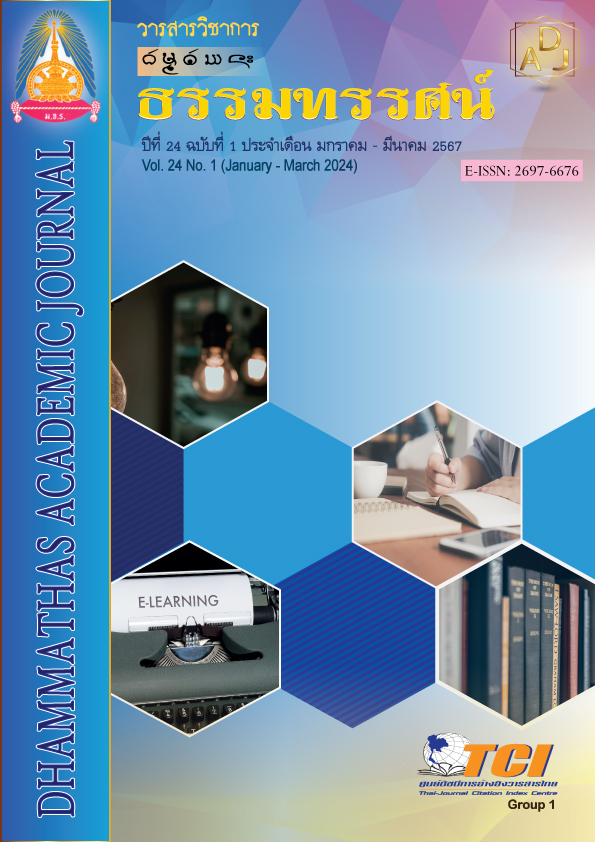The Role of Community Leaders in the Promotion of Buddhist Political Ethics for Local Development in Khon Kaen Province
Main Article Content
Abstract
The objectives of this research were to: 1) Analyze the role of community leaders in Khon Kaen province. 2) Analyze Buddhist Political Ethics in Khon Kaen, and 3) Strengthen Buddhist Ethics for local Development in Khon Kaen province. It is qualitative research using document study and related research. In-depth interview from 35 key informants and focus group discussions by 12 qualified experts. Use content analysis techniques to add content and check the accuracy and completeness of the data using triangulation techniques. The present it descriptively.
The research results were as follows:
1. The role of community leaders in Khon Kaen province used their role to perform duties 6 aspects: 1) Leadership 2) Participation 3) Morality 4) Transparency 5) Rule of law and 6) Tradition.
2. The Buddhist Political Ethics in Khon Kaen province. The community leaders have used their role to control themselves, manage people and manage work with political Ethics. To carry out political and administrative duties according to the doctrines of RᾹJADHAMMA 10, which are divided into categories according to the Threefold training doctrines e.i. 1) the category of SῙLA (the precept or high moral character) includes DᾹNA (charity) SῙLA (the precept) good conduct and AVIHIṀSᾹ (non- violence) 2) The category of SAMᾹDHI (meditation) includes PARICCᾹGA (sacrifice), ᾹJJAVA (honesty), MADDAVA (kindness), TAPA (self-control), AKKODHA (non-anger) and KHANTI (patience) and 3) The category of PAÑÑᾹ (wisdom) include AVIRODHANA (conformity to the Law).
3. Strengthen Buddhist Ethics for local development in Khon Kaen province. The community leaders have strengthened their roles and consumer behavior: namely 1) Political participation 2) Social responsibility 3) Political behavior and 4) Political credibility which responds to the needs of local citizens in 3 areas e.i. 1) Liberty 2) Economy and 3) Peace, which the doctrines of APARIHᾹNIYADHAMMA 7, which is important doctrines for building unity and prosperity to promote local development to be sustainable according to the principles of governance that “Cure Suffering, Nourish Happiness”.
Article Details

This work is licensed under a Creative Commons Attribution-NonCommercial-NoDerivatives 4.0 International License.
เพื่อให้เป็นไปตามกฎหมายลิขสิทธิ์ ผู้นิพนธ์ทุกท่านต้องลงลายมือชื่อในแบบฟอร์มใบมอบลิขสิทธิ์บทความ ให้แก่วารสารฯ พร้อมกับบทความต้นฉบับที่ได้แก้ไขครั้งสุดท้าย นอกจากนี้ ผู้นิพนธ์ทุกท่านต้องยืนยันว่าบทความ ต้นฉบับที่ส่งมาตีพิมพ์นั้น ได้ส่งมาตีพิมพ์เฉพาะในวารสาร วิชาการธรรม ทรรศน์ เพียงแห่งเดียวเท่านั้น หากมีการใช้ ภาพหรือตารางของผู้นิพนธ์อื่นที่ปรากฏในสิ่งตีพิมพ์อื่นมาแล้ว ผู้นิพนธ์ต้องขออนุญาตเจ้าของลิขสิทธิ์ก่อน พร้อมทั้ง แสดงหนังสือที่ได้รับการยินยอมต่อบรรณาธิการ ก่อนที่บทความจะได้รับการตีพิมพ์References
จักรี ศรีจารุเมธีญาณ. (2561). การพัฒนาภาวะผู้นำตามแนวพุทธศาสน์: ทศพิธราชธรรม. วารสารสถาบันวิจัยและพัฒนา มหาวิทยาลัยราชภัฏมหาสารคาม, 5(1), 267-280.
ชาญชัย ฮวดศรี. (2549). บทบาทของพระสงฆ์ในการส่งเสริมคุณธรรมและจริยธรรมในชุมชน เขตปกครองคณะสงฆ์ภาค 9. (รายงานการวิจัย). พระนครศรีอยุธยา: มหาวิทยาลัยมหาจุฬาลงกรณราชวิทยาลัย.
โชคสุข กรกิตติชัย. (2565). การดำเนินคดีอาญากับผู้ดำรงตำแหน่งทางการเมือง. เข้าถึงได้จาก https://www.parliament.go.th/ewtadmin/ewt/parliament_ parcy/ewt_dl_ link.php?nid=43427
ไทย พีบีเอส (Thai PBS). (2566). ย้อนรอย “อดีต 9 นักการเมืองชื่อดัง” ถูกจองจำในคุกจริง. เข้าถึงได้จาก https://www.thaipbs.or.th/news/content/330930
พระครูธรรมธรนิเทศ อภิญาโณ, ยุทธนา ประณีต และสุรพล สุยะพรหม. (2560). การบริหารกิจการบ้านเมืองที่ดีตามหลักพุทธธรรมขององค์กรปกครองส่วนท้องถิ่นในจังหวัดอุบลราชธานี. วารสาร มจร สังคมศาสตร์ปริทรรศน์, 6(2) ฉบับพิเศษ, 1-14.
พระครูปลัดเกษฎา ผาทอง. (2562). บทบาทของพระสงฆ์กับการเสริมสร้างวัฒนธรรมทางการเมืองในพื้นที่ประเทศกัมพูชา ลาว พม่า และไทย. (ดุษฎีนิพนธ์รัฐศาสตรดุษฎีบัณฑิต). นนทบุรี: มหาวิทยาลัยสุโขทัยธรรมาธิราช.
พระธรรมปิฎก (ป.อ.ปยุตฺโต). (2546). จริยธรรมนักการเมือง. เข้าถึงได้จาก https://www.watnyanaves.net/th/book_detail/114
พระมหาอานันต์ เจริญศิริพัชร และจักรี ศรีจารุเมธีญาณ. (2564). พุทธศาสนากับการปกครอง. วารสารมนุษยศาสตร์และสังคมศาสตร์ มมร. วิทยาเขตอีสาน, 2(1), 50-58.
พลเผ่า เพ็งวิภาศ. (2559). การวิเคราะห์ผลกระทบสถานะบทบาทและองค์ความรู้ของประเพณี ฮีตสิบสอง คองสิบสี่ ในจังหวัดขอนแก่น. (รายงานการวิจัย). พระนครศรีอยุธยา: มหาวิทยาลัยมหาจุฬาลงกรณราชวิทยาลัย.
สมเด็จพระพุทธโฆษาจารย์ (ป.อ.ปยุตฺโต). (2559). ภาวะผู้นำ และจริยธรรมนักการเมือง. เข้าถึงได้จาก https://www.watnyanaves.net/th/book_detail/538
สำนักข่าวไทย อสมท. (2566). ศาลยกฟ้องคดีทุจริตสหกรณ์ครูที่ขอนแก่น. เข้าถึงได้จาก https://tna.mcot.net/region-1246907
สำนักงานจังหวัดขอนแก่น, ศูนย์ปฏิบัติการต่อต้านทุจริต (ศปท.) จังหวัดขอนแก่น. (2566). ผลดำเนินงานจัดการเรื่องร้องเรียนร้องทุกข์ กรณีร้องเรียนการทุจริตและประพฤติมิชอบของเจ้าหน้าที่ของรัฐของศูนย์ดำรงธรรมจังหวัดขอนแก่น ประจำปีงบประมาณ พ.ศ. 2566. เข้าถึงได้จาก https://sites.google.com/view/hrkhonkaen/%E0%B8%A8%E0%B8%9B%E0%B8%97
หนังสือพิมพ์โคราชคนอีสาน. (2563). ปธ. สหกรณ์ออมทรัพย์ครูขอนแก่น เผย “เอกราช” สารภาพยักยอกเงิน 431 ล. เข้าถึงได้จาก https://www.koratdaily.com/blog.php?id=13992
Helana, C. (1999). Democracy in Practice. London: Routledge.

